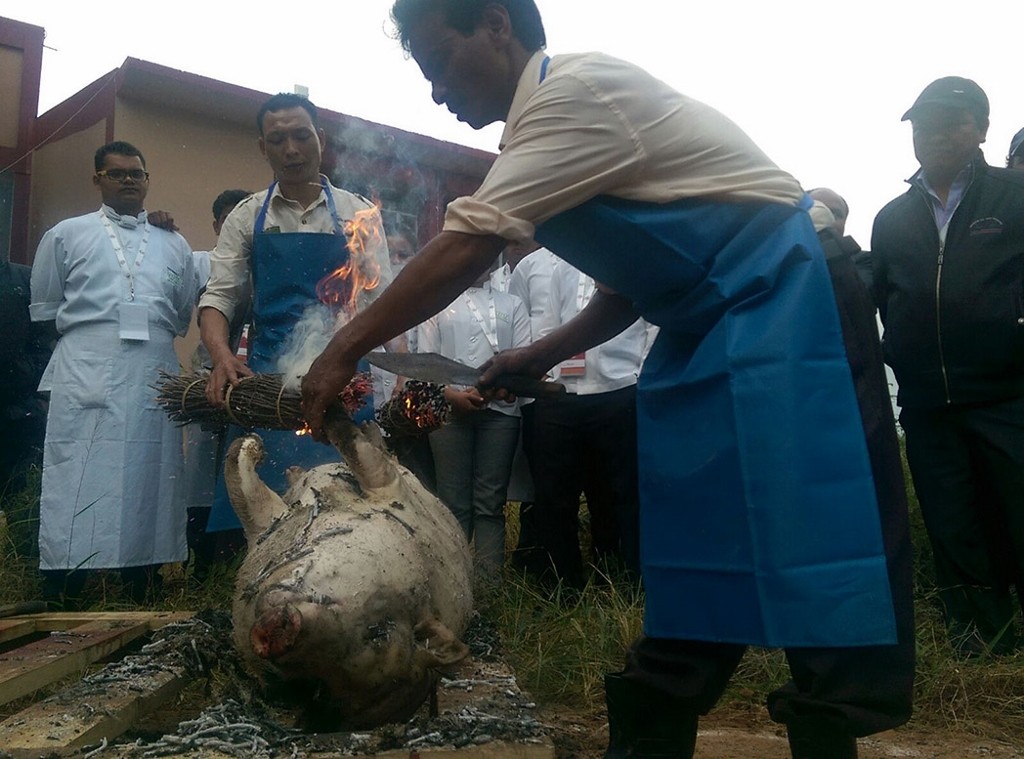 Following a grand opening on the 3rd November, the ITM 2015 entered the second day which saw a number of sessions and workshops. The Theatre of Taste designed to highlight various scintillating subjects also commenced today aside from the plenary sessions on various key themes to be discussed over the two days of the conference. Topics such as Temple Foods of India, the Sinchu Tea of Assam, Honey, Fermented Foods and Butchery Workshop or “Slow meat” are to find centre stage in the “Theatre”.
Following a grand opening on the 3rd November, the ITM 2015 entered the second day which saw a number of sessions and workshops. The Theatre of Taste designed to highlight various scintillating subjects also commenced today aside from the plenary sessions on various key themes to be discussed over the two days of the conference. Topics such as Temple Foods of India, the Sinchu Tea of Assam, Honey, Fermented Foods and Butchery Workshop or “Slow meat” are to find centre stage in the “Theatre”.
The Institute of Hotel Management, Shillong is the venue for the Slow Meat Workshop, a two day program which workshop will bring out the various methods of slaughter, butchery and processing in order for each to gain and take knowledge to “meat” a better future. With the ITM, designed to be a sharing and exchange of information, knowledge, skill and most importantly ideas transpired into the most practical manner possible, the Slow Meat Workshop is one such platform to facilitate this gathering and understand the differences in how butchers form different backgrounds can come to together to learn and share from and with each other.
Today saw the butchering style of the Navajo tribe from USA who brought their experience on livestock rearing along with their skill set on butchering meat with different cuts to share their work. The Ka Seng Ki Nong De Dohsniang Butchers association also contributed by showcasing their ways and means of slaughter, butchery and the various products that they also put together. Jürgen Kroeber, Master butcher from Germany who observed the two groups will bring his skill on processing meat and utilizing all parts to make diverse artisanal products on the second day.
Kroeber expressed how impressed he was with the butchering style is of both the groups. He pointed out that the techniques were both sustainable and traditional. He particularly stressed on how humane the Khasi way of butchering was. As compared to the style of the Navajo people which involves the slitting the throat of the animal, the Khasi style involves suffocating the animal in such a way that the animal suffers less and is killed in a matter of seconds. He also spoke about how impressed he was impressed, not only with the butchery buts also the cleaning of the animal. ” I appreciate this healthier, cleaner, economical and traditional style of butchery. It is economically sustainable by way of using traditional methods and tools which also provides livelihood for the people who make the tools used in slaughtering, ” said Kroeber who will be demonstrating his method tomorrow. Following the butchery, Chef from Navajo demonstrated various dishes cooked by his community. The students of IHM who were also present as observers took the opportunity to interact with the butchery experts. Kroeber was also impressed with how eager to learn the students were. The representatives of the Khasi Butchers’ Association later expressed their happiness in being able to be a whorkshop such as this which gave them the opportunity, not only to learn from experts of other countries but also to showcase their own styles.
The meat coming out from these sessions will be used to cook various dishes from each of the participating countries.
NESFAS and the Institute of Hotel Management Shillong had joined hands towards facilitating skill development in the areas of hospitality and culinary skill earlier this year as their joint commitment towards the ITM.
Organized by NESFAS, the Indigenous Partnership for Agrobiodiversity and Food Sovereignty, Slow Food International and 41 host villages, ITM 2015, is a cultural melting pot that has brought together participants from of no less than 52 countries and more than 70 indigenous communities from all over the world beginning from the 3rd to 7th of November 2015.
 Translate
Translate




